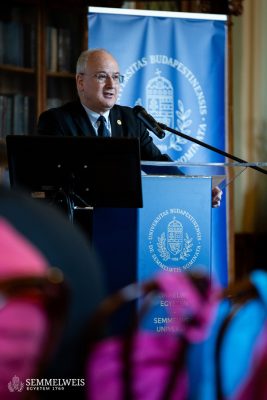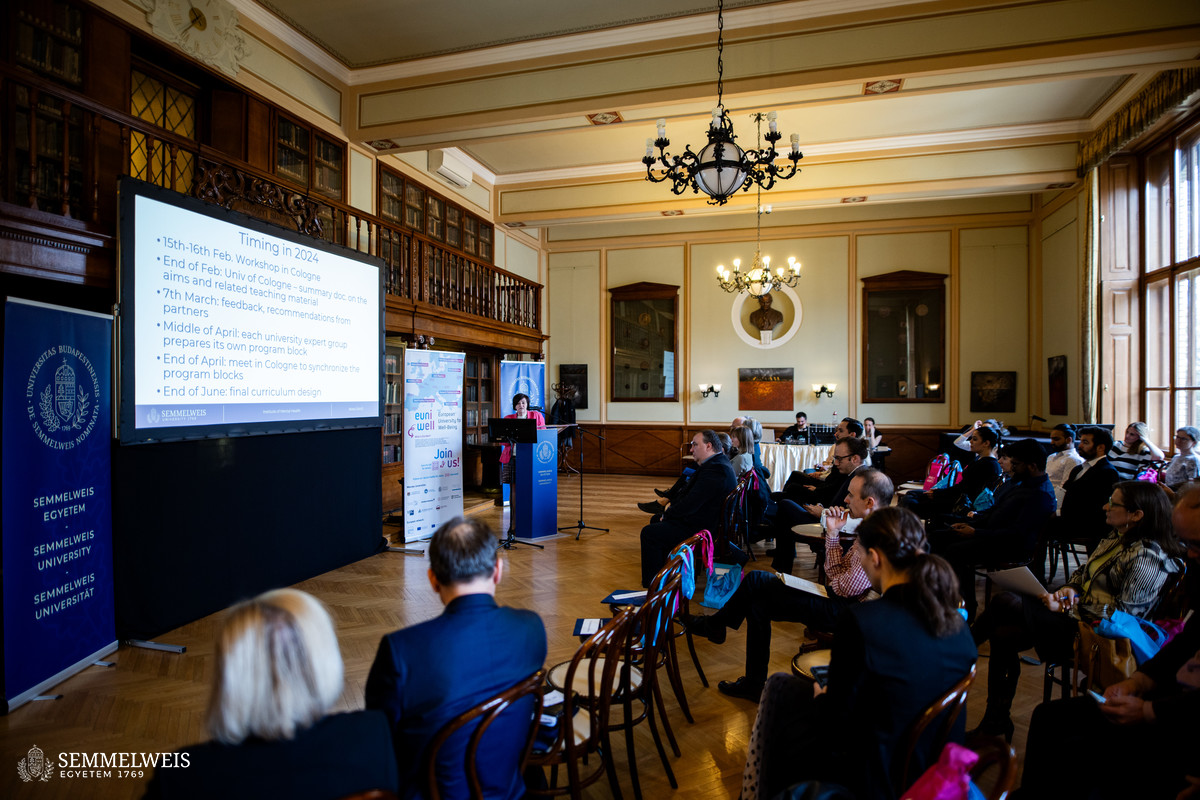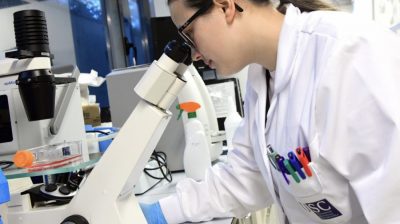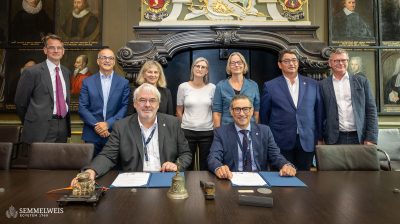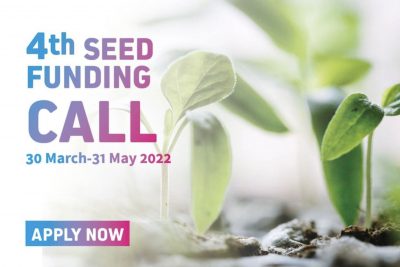The event was opened by Dr. Miklós Kellermayer, Dean at Semmelweis University and EUniWell Steering Group member. The Dean of the Faculty of Medicine reminded the audience that EUniWell Alliance started with the collaboration of seven universities across Europe; and it consists of 11 member universities now. He underlined the fact that the EUniWell Seed Funding Programme is highly fruitful from the beginning and launched important and exciting collaborations to grow. „I am happy to say that Semmelweis University has successfully joined many EUniWell Seed Funding projects, and we are also successful in establishing various programs with EUniWell’s support,” he added.
The dean expressed his gratitude to everyone who has been participating and collaborating the EUniWell programs, and moved on to explain the issues concerning the university’s membership. „Despite the exclusionary EU decision regarding the Erasmus educational and Horizon research programs, we have continued the work we started, and Semmelweis University is currently an associated member of the consortium. However, the alliance looks upon Semmelweis University as a strong founding member, and we hope that the university becomes a full member again. Until then, we carry on with our goals and objectives, which is primarily contributing to the EUniWell Health and Well-Being Arena,” he stressed, underlining that the university’s work so far has already established Semmelweis University as a truly contributing and value-generating university in the consortium.
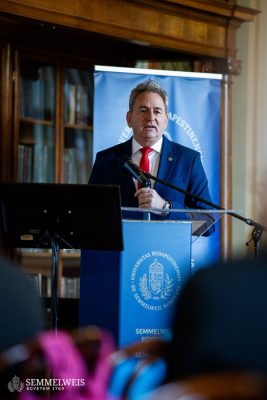 Followed by Dr. Kellermayer’s greetings, Dr. Marcel Pop, Director of the Directorate of International Relations gave an overview of EuniWell’s history, mentioning that the consortium was founded in 2019, and after a pilot phase from November 2020 to October 2023, they finally moved onto the second phase, from November 2023 until October 2027. The director then presented the main s achievements and results of EUniWell working groups, the EUniWell Research and Innovation ecosystem, and the major EUniWell collaborations with over 40 projects regarding the EUniWell Seed Funding Programs including the current open call for collaborations. As for the later, it was pointed out that it has a priority for innovative proposals, and the main project categories are research, education, policy development, and student well-being. The selected Seed Funding projects need a minimum of 4 partner universities per project, with a maximum grant of 25,000 EUR and 12 months of duration, he explained.
Followed by Dr. Kellermayer’s greetings, Dr. Marcel Pop, Director of the Directorate of International Relations gave an overview of EuniWell’s history, mentioning that the consortium was founded in 2019, and after a pilot phase from November 2020 to October 2023, they finally moved onto the second phase, from November 2023 until October 2027. The director then presented the main s achievements and results of EUniWell working groups, the EUniWell Research and Innovation ecosystem, and the major EUniWell collaborations with over 40 projects regarding the EUniWell Seed Funding Programs including the current open call for collaborations. As for the later, it was pointed out that it has a priority for innovative proposals, and the main project categories are research, education, policy development, and student well-being. The selected Seed Funding projects need a minimum of 4 partner universities per project, with a maximum grant of 25,000 EUR and 12 months of duration, he explained.
The section above was followed by a number of short presentations on the EUniWell engagement and activities at Semmelweis University.
Dr. György Purebl, Director of the Institute of Behavioral Sciences spoke about the EUniWell Study and Health Promotion Programme, which will be partly based on the results of the Semmelweis Study Programme. Essentially, he drew attention to the major health challenges of the 21st century, and the importance of addressing those challenges effectively, and also presented the main pillars of providing supporting programs for employees and students.
Dr. Beáta Pethesné Dávid, Director of the Institute of Mental Hygiene introduced the EUniWell Joint Professional Master Program and the Unimatter Seed Funding project in detail to those interested. As for their opportunities and challenges, she mentioned synchronizing both the knowledge and the international team members, approach as many students as possible, and ensure effective support through all university channels.
Dr. Zoltán Lantos, Director of the Department of Health Promotion Methodology at the Faculty of Health Sciences talked about the Digital University and the SimuVaction Seed Funding Project, outlining a digital implementation roadmap including IT group workshops and a digital innovation hub. He also highlighted the aspect of AI in the help of eradicating health inequalities. The participating students gained experience in a simulation titled “AI and Health Disparities on a Global Stage”.
Dr. István Mándity, Director of the Institute of Organic Chemistry gave an overview of the TTPep – Peptides for Well-Being project and the Sustainable and green upscaling processes for peptide(-based) in vitro diagnostics and cosmeceuticals projects. Basically, its aim is to promote peptides while educating new generations in this field of natural and sustainable molecules with substantial impacts on health and well-being.
Dr. Richárd Kiss, pathologist at the Department of Pathology and Experimental Cancer Research introduced the ACTA project, which is tackling the taboo of cancer through contemporary art. Our website gave detailed information about this initiative, a year-long project within the EUniWell Seed Funding Programme that aims to bring together health professionals, students, patients and artists in workshops to explore different aspects of the disease.
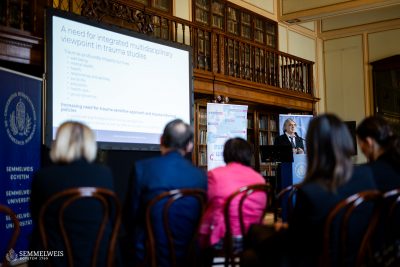 Dr. Zsolt Unoka, Professor at the Department of Psychiatry and Psychotherapy briefly introduced the Trauma and Well-Being Seed Funding Project, which is about developing an interdisciplinary, collaborative online certificate program in trauma studies. According to him, there is an increasing need for trauma-sensitive approach and also, trauma-informed policies.
Dr. Zsolt Unoka, Professor at the Department of Psychiatry and Psychotherapy briefly introduced the Trauma and Well-Being Seed Funding Project, which is about developing an interdisciplinary, collaborative online certificate program in trauma studies. According to him, there is an increasing need for trauma-sensitive approach and also, trauma-informed policies.
Dr. Petra Dunkel, Assistant Professor at the Institute of Organic Chemistry presented the EUniWell Leadership Fellowship Programme. According to her, the program was kicked off last October in Cologne and evolved into an excellent training program, which basically supports young researchers in developing and improving their leadership skills with innovative methodological approaches.
Followed by that, Dr. Judit Sahin-Tóth, Assistant Lecturer at the Institute of Medical Microbiology showcased the EUniWell Visiting Fellowship Program. Thanks to the Program four Semmelweis colleagues spent more than one month at the University of Birmingham. According to the speaker, this project aimed to broaden skills in the laboratory field and establish connections for future collaborations within research endeavors.
For more information about EUniWell, visit https://www.euniwell.eu.
Directorate of Communication
Photo: Gábor Ancsin / Kepszerk.hu
